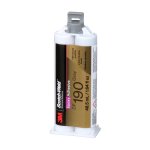Bugsysiegals
Member
- Joined
- Mar 19, 2016
- Messages
- 893
I have a Rigid vacuum and the connector port the hose connects to was never "glued" into the vacuum's body very well so anytime I pull the hose tightly it pulls the hose/connector out. I'm considering epoxying this connector to the body but I'm not sure what will be best to bond them. I also broke a plastic caster wheel on my desktop PC yesterday and perhaps the same can be used.
My brother said he uses Gorilla Glue 2 part epoxy mix for his occasional projects but wanted the thoughts of those who do this kind of stuff more consistently or professionally ... what do you recommend?
My brother said he uses Gorilla Glue 2 part epoxy mix for his occasional projects but wanted the thoughts of those who do this kind of stuff more consistently or professionally ... what do you recommend?

